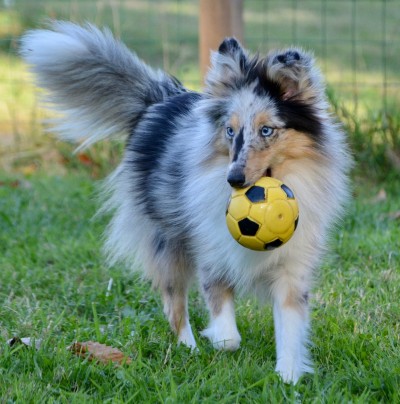Shetland Sheepdog Health Care & Feeding
By Michele Welton, Dog Trainer, Breed Selection Consultant, Author of 15 Dog Books

Start your Shetland Sheepdog off on the right foot by feeding the right food, giving the right vaccinations, finding the right vet, and if you're going to spay or neuter, don't do it too early.
Jump down to this list of
Sheltie Health Problems
Or check out my advice for raising a healthy Shetland Sheepdog puppy or adult dog:
 Dog Health Care – The Sensible Way
Dog Health Care – The Sensible Way
Read my advice on daily health care so your Sheltie lives a long, healthy life and seldom needs to see the vet... [read more]
 3 Best Ways To Feed Your Dog Healthy Food
3 Best Ways To Feed Your Dog Healthy Food
You can dramatically increase your dog's chances of living a long, healthy life by feeding the right food. Cutting right to the chase, the best foods for your Shetland Sheepdog are... [read more]
 A Quick Way To Make Homemade Dog Food
A Quick Way To Make Homemade Dog Food
Your Sheltie will love real chicken, turkey, beef, fish, eggs, yogurt, broccoli.... this is not just "people food" and I'll tell you why... [read more]
 5 Best Kibble and Canned Dog Foods
5 Best Kibble and Canned Dog Foods
Some are better than others, but I must be honest – I'm not a huge fan of dry or canned dog food. Here are my concerns... [read more]
 Vaccinations and Booster Shots: Needed or Not?
Vaccinations and Booster Shots: Needed or Not?
How many vaccinations does your Shetland Sheepdog puppy really need? Does your adult dog need yearly booster shots? The vaccination guidelines have changed! Find out what some vets aren't telling you... [read more]
 Spaying Your Female Dog: Pros and Cons
Spaying Your Female Dog: Pros and Cons
Should your female Shetland Sheepdog be spayed? Current research says, "The AGE at which you spay can be vitally important to your dog's future health." So what's the best age? [read more]
 Neutering Your Male Dog: Pros and Cons
Neutering Your Male Dog: Pros and Cons
Have you been told that you must neuter your male Sheltie? Current research shows that the issue is not so simple. Pet owners are not being told about some risks associated with neutering male dogs, especially neutering too early... [read more]
 Make Sure Your Vet is the Best!
Make Sure Your Vet is the Best!
Is your current veterinarian really the best choice for your dog? Here's how to tell... [read more]
 Assisi Loop Review
Assisi Loop Review
Does your Sheltie suffer from arthritis, hip dysplasia, disk disease, colitis? My honest review of a veterinary device you can use at home to reduce inflammation and pain. [read more]

Complete list of Shetland Sheepdog health problems
Many Shelties are blind or vision-impaired, from hereditary eye diseases like collie eye anomaly, cataracts, progressive retinal atrophy (PRA), coloboma, eyelash abnormalities, and a particularly severe and painful form of corneal dystrophy.
Epilepsy is a serious concern in Shelties, and heart disease (patent ductus arteriosus) is also a concern.
The severest form of von Willebrand's blood-clotting disease occurs in Shelties. Fortunately, a simple DNA test is available so you can find out at any time whether your Shetland Sheepdog has von Willebrand's disease, carries it, or is completely clear of it.
Cancer of the bladder (transitional cell carcinoma) occurs more often in Shetland Sheepdogs than in most other breeds.
Hormonal/endocrine system diseases include diabetes and hypothyroidism. According to the Michigan State University Thyroid Database, up to 19% of Shetland Sheepdogs have low thyroid levels.
Skin problems are common in Shetland Sheepdogs, especially allergies, which cause itchy skin and often lead to bacterial skin infections.
Other skin conditions in Shelties stem from autoimmune diseases, where the immune system is defective and attacks its own skin. Autoimmune diseases that attack the skin in Shelties include pemphigus and lupus.
Also dermatomyositis, in which the skin (derma) and muscle (myo) become inflamed (itis). This disease affects Collie and Sheltie puppies at 3-6 months old. Crusty skin lesions come and go until eventually the puppy outgrows the condition, though there may be permanent scars. In more severe cases, the puppy may experience muscle wasting, though this occurs more often in Collies than in Shelties. Skin lesions become worse when exposed to ultraviolet light, so keep affected dogs indoors as much as possible. A milder form of this disease, with skin lesions confined to smaller areas, can occur in middle-aged and older Shelties.
Inherited deafness can occur in Shelties, especially those with a lot of white on their head.
The most worrisome orthopedic disease in Shetland Sheepdogs is a degenerative hip disease called Legg-Calve-Perthes.
But other orthopedic diseases are more common, including luxating patella (loose knees), hip dysplasia, and elbow dysplasia. The Orthopedic Foundation of America evaluated the hip X-rays of 22,000 Shelties and found 5% dysplastic: not terrible. Elbow dysplasia and luxating patella rates are between 2 and 3%. Nice.
A severe neurological disease, degenerative myelopathy, can occur in Shelties. It begins with weakness in the hind legs and can progress to total paralysis.
Shetland Sheepdogs and other collie-type breeds often react adversely to certain drugs such as ivermectin (in heartworm prevention products such as Heartguard), Imodium A-D, flagyl, and certain anesthetics. If your dog has a mutant gene called mdr1, he cannot pump these drugs out of his brain, which results in neurological toxicity. Don't give any of these drugs to your Sheltie unless he has been tested for this mutant gene. It's a simple DNA test offered by the Washington State University Veterinary School.
Shelties are prone to losing pigment on their nose and muzzle – this can be caused by nasal solar dermatitis or lupus, but most commonly it's a harmless condition called "snow nose" where the nose only loses pigment in the winter.
Preventing health problems
Some health problems are inherited. For example, if your dog inherits from his parents the genes for an eye disease called PRA, he will go blind and there's nothing anyone can do about it.
 But most health problems can be prevented by the ways you raise your dog.
But most health problems can be prevented by the ways you raise your dog.
FREE eBOOK! My free online health care program, 11 Things You Must Do Right To Keep Your Dog Healthy and Happy shows you how to raise your Shetland Sheepdog in all the right ways that help prevent health problems. Become your dog's health care champion!
My best-selling books – now available FREE on my website
 Respect Training For Puppies: 30 seconds to a calm, polite, well-behaved puppy is for puppies 2 to 18 months old. Your puppy will learn the 21 skills that all family dogs need to know. Click here to read for free.
Respect Training For Puppies: 30 seconds to a calm, polite, well-behaved puppy is for puppies 2 to 18 months old. Your puppy will learn the 21 skills that all family dogs need to know. Click here to read for free. Teach Your Dog 100 English Words is a unique Vocabulary and Respect Training Program that will teach your adult dog to listen to you and do what you say. Click here to read for free.
Teach Your Dog 100 English Words is a unique Vocabulary and Respect Training Program that will teach your adult dog to listen to you and do what you say. Click here to read for free. 11 Things You Must Do Right To Keep Your Dog Healthy and Happy helps your dog live a longer, healthier life. Get my honest advice about all 11 Things before you bring home your new puppy, because some mistakes with early health care cannot be undone. Click here to read for free.
11 Things You Must Do Right To Keep Your Dog Healthy and Happy helps your dog live a longer, healthier life. Get my honest advice about all 11 Things before you bring home your new puppy, because some mistakes with early health care cannot be undone. Click here to read for free.

